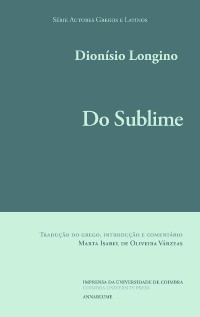Please use this identifier to cite or link to this item:
https://hdl.handle.net/10316.2/38162| DC Field | Value | Language |
|---|---|---|
| dc.contributor.author | Longino, Dionísio | por |
| dc.contributor.author | Várzeas, Marta Isabel de Oliveira, trad. | por |
| dc.date.accessioned | 2015-11-30T17:11:19Z | |
| dc.date.accessioned | 2020-03-14T11:31:18Z | - |
| dc.date.available | 2015-11-30T17:11:19Z | |
| dc.date.available | 2020-03-14T11:31:18Z | - |
| dc.date.issued | 2015 | - |
| dc.identifier.isbn | 978-989-26-1092-4 | por |
| dc.identifier.isbn | 978-989-26-1093-1 (PDF) | por |
| dc.identifier.uri | https://hdl.handle.net/10316.2/38162 | por |
| dc.description.abstract | Comes from the 10th century the oldest codex with the treatise On the Sublime. For a long time attributed to Cassius Longinus (third century ), the text is now generally considered a first century work, written by an anonymous or a Dionysius Longinus whose life and work is unknown. Ignored, as it seems, in Antiquity and the Middle Ages, the text came to meet its editio princeps only in 1554, in Basel and by the hand of Francesco Robortello. It was then successively edited and translated, first into Latin and later into several European languages, starting with the famous French version of Boileau that for a long time was the main source for the knowledge of the treatise in Europe. Peri Hypsous moves away from the stylistic approach of ancient rhetorical books and presents a definition of Sublime as a quality of discourse which produces in the hearers and readers not persuasion but wonder and ecstasy. It is precisely this idea of wonder and shudder that has inspired the works of Burke (A Philosophical Enquiry into the origin of our Ideas of the Sublime and Beautiful, 1757) and Kant, by whose hands the treatise On the Sublime entered the history of Western Aesthetics. | eng |
| dc.description.abstract | Data do séc. X o mais antigo códice com o tratado Do Sublime. Durante muito tempo atribuído a Cássio Longino (séc. III), o opúsculo é hoje geralmente considerado obra do séc. I, escrita por um anónimo ou por um Dionísio Longino do qual muito pouco se sabe. Ignorado, ao que parece, na Antiguidade e na Idade Média, só em 1554, em Basileia e pela mão de Francesco Robortello, veio o texto a conhecer a sua editio princeps, tendo sido depois sucessivamente editado e traduzido, primeiro para latim e, posteriormente, para várias línguas europeias, a começar pela célebre versão francesa de Boileau que, na Europa Ilustrada, se tornou a principal via de acesso ao tratado. Na linha de uma visão da arte retórica mais próxima do que entendemos por crítica literária, o Peri Hypsous afasta-se da abordagem estilística consagrada nos tratados de Retórica para definir o Sublime como uma qualidade dos discursos que suscita nos ouvintes e leitores não tanto a persuasão quanto o assombro e o êxtase. Ora é precisamente esta ideia de assombro e estremecimento suscitados pela linguagem literária que há-de inspirar as obras de Burke (A Philosophical Enquiry into the origin of our Ideas of the Sublime and Beautiful, 1757) e de Kant, entrando, assim, definitivamente o Do Sublime na história da Estética ocidental. | por |
| dc.language.iso | por | por |
| dc.publisher | Imprensa da Universidade de Coimbra | por |
| dc.relation.ispartof | Classica Digitalia | por |
| dc.rights | open access | por |
| dc.subject | Sublime | eng |
| dc.subject | Literature | eng |
| dc.subject | Aesthetics | eng |
| dc.subject | Rhetoric | eng |
| dc.subject | Sublime | por |
| dc.subject | literatura | por |
| dc.subject | estética | por |
| dc.subject | retórica | por |
| dc.title | Do sublime | por |
| dc.title.alternative | On the sublime | eng |
| dc.type | book | por |
| uc.publication.location | Coimbra | por |
| dc.identifier.doi | 10.14195/978-989-26-1093-1 | por |
| uc.publication.digCollection | PB | por |
| uc.publication.area | Artes e Humanidades | por |
| uc.publication.manifest | https://dl.uc.pt/json/iiif/10316.2/38162/149027/manifest?manifest=/json/iiif/10316.2/38162/149027/manifest | - |
| uc.publication.thumbnail | https://dl.uc.pt/retrieve/8101705 | - |
| uc.itemId | 54537 | - |
| item.grantfulltext | open | - |
| item.fulltext | With Fulltext | - |
| Appears in Collections: | Pombalina | |
Files in This Item:
| File | Description | Size | Format | |
|---|---|---|---|---|
| do_sublime.pdf | 1.42 MB | Adobe PDF |  |
Items in DSpace are protected by copyright, with all rights reserved, unless otherwise indicated.
